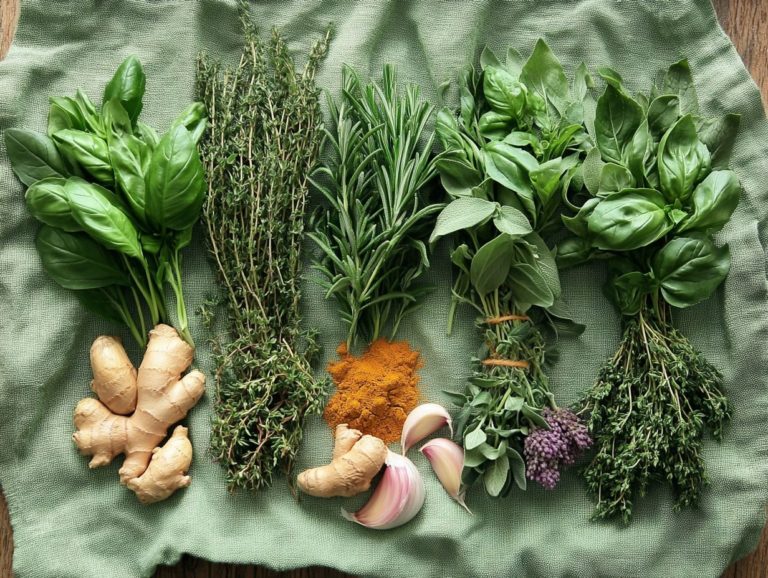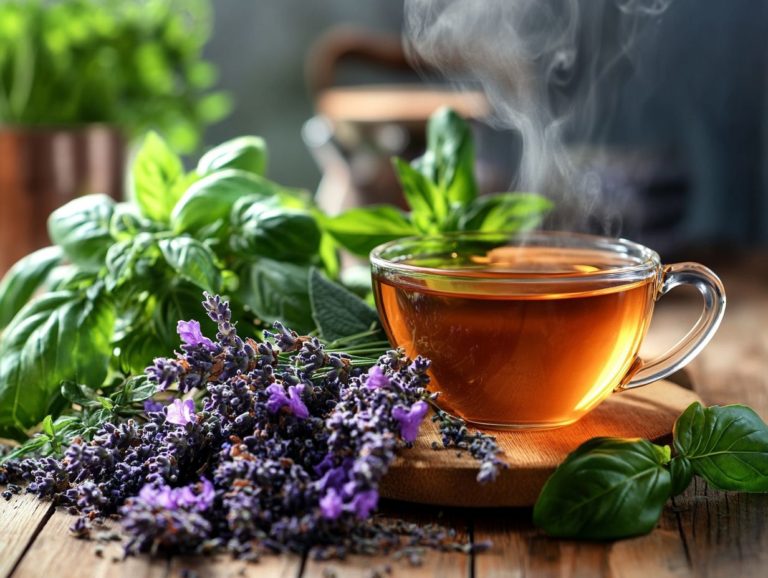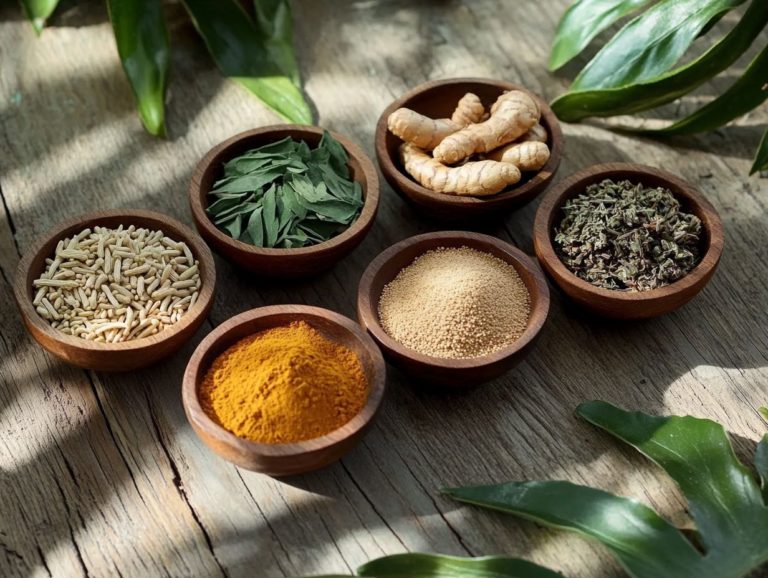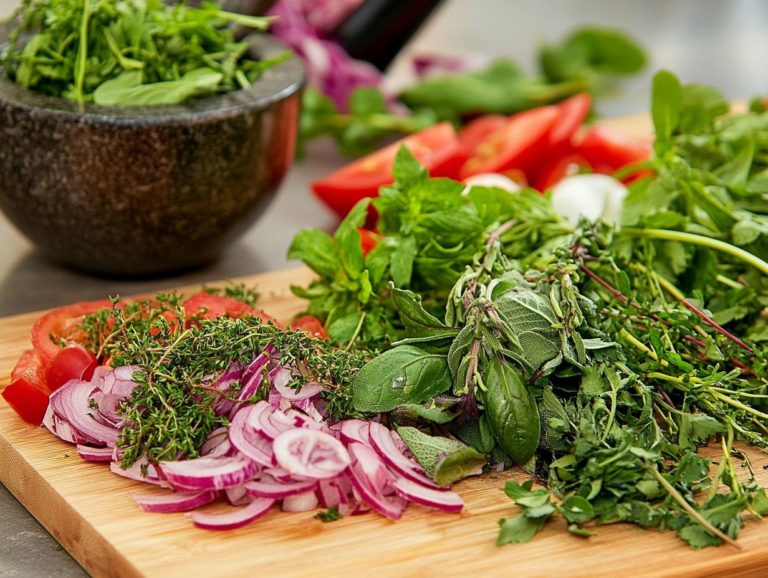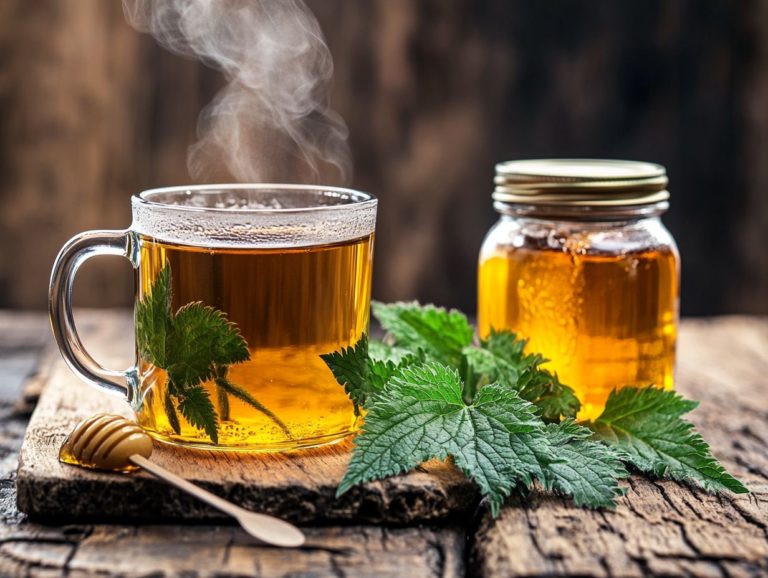5 Herbal Remedies for Children’s Health
In a world that increasingly embraces natural solutions, herbal remedies provide a soothing approach to your child s health.
From the calming effects of chamomile tea to the immune-boosting properties of echinacea, nature offers gentle alternatives for parents seeking options beyond conventional medicine.
This article explores five effective herbal remedies, outlining their uses for common ailments and essential safety considerations for administration.
Discover how these natural options can enhance your child s well-being while seamlessly fitting into your daily routine.
Contents
- Key Takeaways:
- 1. Chamomile Tea for Calming and Soothing
- 2. Echinacea for Boosting Immunity
- 3. Ginger for Nausea and Digestive Issues
- 4. Peppermint for Headaches and Muscle Pain
- 5. Honey for Cough and Sore Throat
- Why Choose Herbal Remedies for Children?
- What Are the Safety Concerns with Herbal Remedies for Children?
- What Are the Different Forms of Herbal Remedies for Children?
- How Can Parents Administer Herbal Remedies to Their Children?
- What Are the Common Illnesses That Can Be Treated with Herbal Remedies?
- Are There Any Side Effects of Using Herbal Remedies for Children?
Key Takeaways:
- Chamomile tea calms and soothes children, helping with anxiety and restlessness.
- Echinacea helps boost children’s immunity and protects against common illnesses.
- Ginger effectively treats nausea and digestive problems in children.
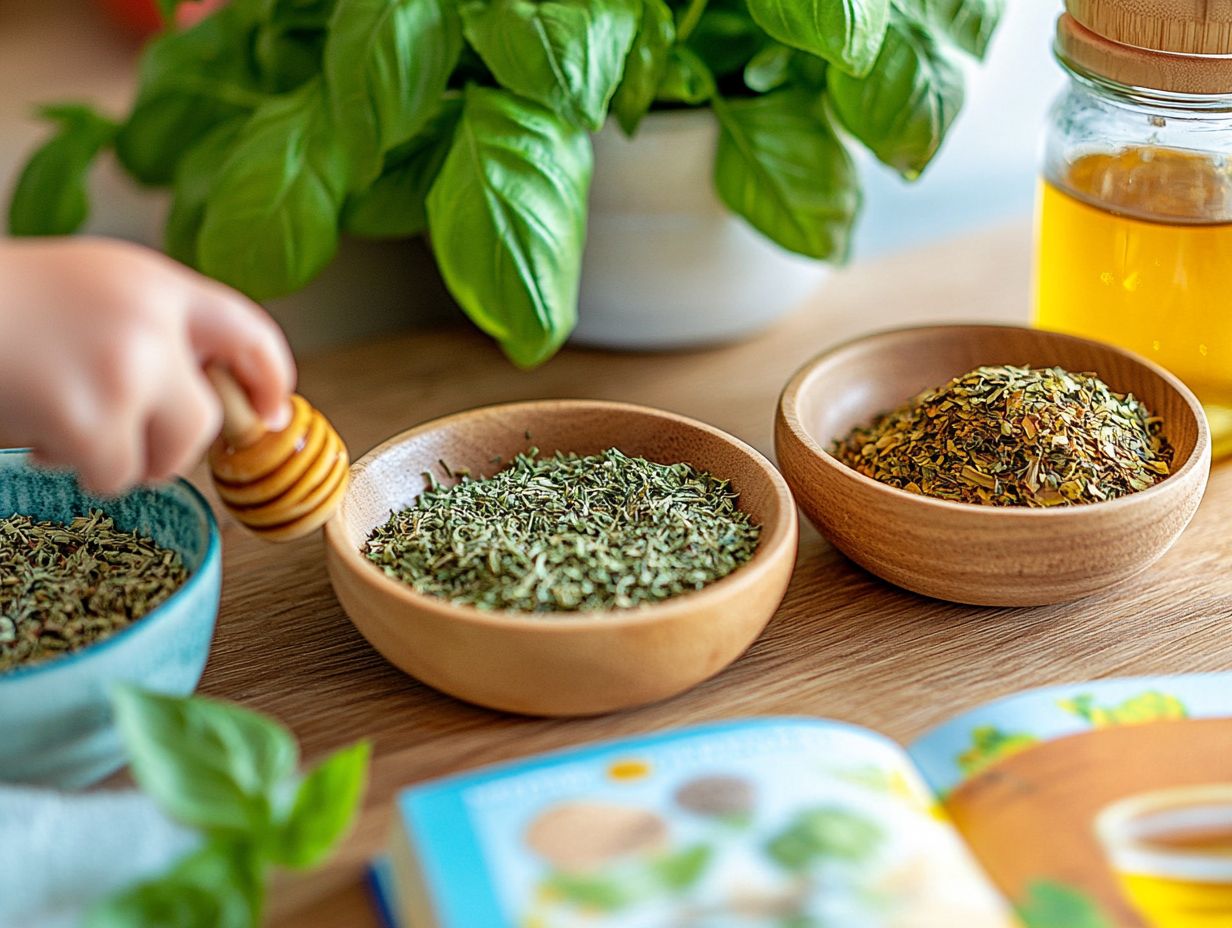
1. Chamomile Tea for Calming and Soothing
Chamomile tea is a delightful herbal remedy known for its calming and soothing qualities. It s an excellent choice for children who need relief from anxiety and support for healthy sleep.
This lovely infusion tastes incredible and combines the benefits of soothing herbs to enhance your child’s health.
Chamomile tea also works wonders for digestion, alleviating tummy troubles and serving as a gentle option for little ones feeling discomfort after meals.
When offered in moderation, it can be a wonderful addition to your child s diet, often blended with other mild herbs like lemon balm or peppermint for a comforting mix.
These combinations provide wellness support, helping your children feel more relaxed while enjoying a delicious beverage.
Consider transforming this soothing tea into a calming evening ritual, fostering a sense of security and tranquility as bedtime approaches.
2. Echinacea for Boosting Immunity
Echinacea is a strong immune helper, particularly beneficial for children who frequently encounter colds and infections. This herb is a staple in natural medicine and herbal remedies for kids’ health.
It stimulates the production of white blood cells, which are vital in combating pathogens. Echinacea is available in various forms tinctures, capsules, and soothing teas making it easy to integrate into your child’s routine.
While Echinacea is generally safe, ensure the dosage aligns with your child’s age and weight. Always check with a doctor to ensure your little one is safe while enjoying these natural remedies!
3. Ginger for Nausea and Digestive Issues
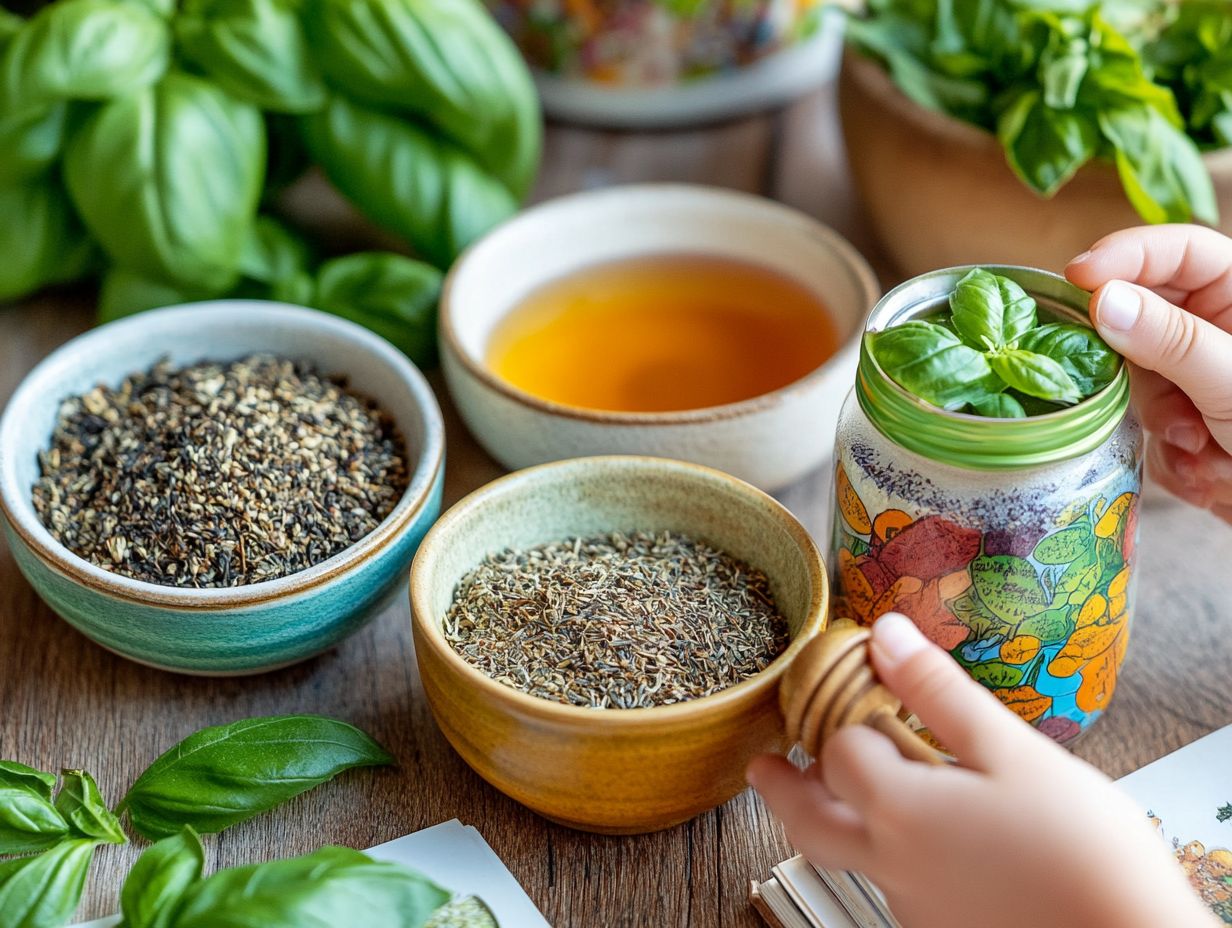
Ginger is an amazingly versatile herb, renowned for alleviating nausea and digestive issues. It s a valuable asset in your collection of herbal remedies for children’s health.
This amazing root is enjoyable in many forms, from soothing ginger tea and potent tinctures to flavorful additions in meals, providing both relief and enjoyment. Many parents use it for kids grappling with motion sickness or upset stomachs.
Imagine serving a comforting cup of ginger tea, steeped with honey and lemon; it calms the tummy and tastes delightful kids love it!
Incorporating ginger into daily meals is a breeze add it to stir-fries, smoothies, or whip up some gingerbread cookies. This makes it an effortless and effective way to promote healthy digestion.
4. Peppermint for Headaches and Muscle Pain
Peppermint is celebrated for its soothing effects, particularly in alleviating headaches and muscle pain. This makes it a favored herbal remedy that fits seamlessly into children’s health regimens and holistic healing practices.
This aromatic herb boasts impressive pain-relieving properties, offering relief for both adults and children when used appropriately.
Peppermint tea is a gentle introduction to its benefits; the warm infusion soothes tension and promotes relaxation.
When diluted correctly, peppermint oil can be applied topically to ease sore muscles or combat headaches. It’s crucial to consult a healthcare professional before incorporating these remedies into your child’s routine to ensure safety and suitability for their individual needs.
5. Honey for Cough and Sore Throat
Honey serves as a natural remedy for cough and sore throat, offering sweet relief for kids and acting as a safe, effective ingredient in various herbal remedies.
Rich in antioxidants and boasting impressive antimicrobial properties, honey coats the throat and may combat the bacteria that cause irritation. Its thick consistency helps trap airborne irritants, adding an extra layer of comfort.
It’s important to remember that honey shouldn t be given to infants under one year of age due to the risk of botulism. For older children, it can be a delightful and beneficial addition to herbal teas or warm water, ensuring they stay comfortable during cold and flu seasons.
Why Choose Herbal Remedies for Children?
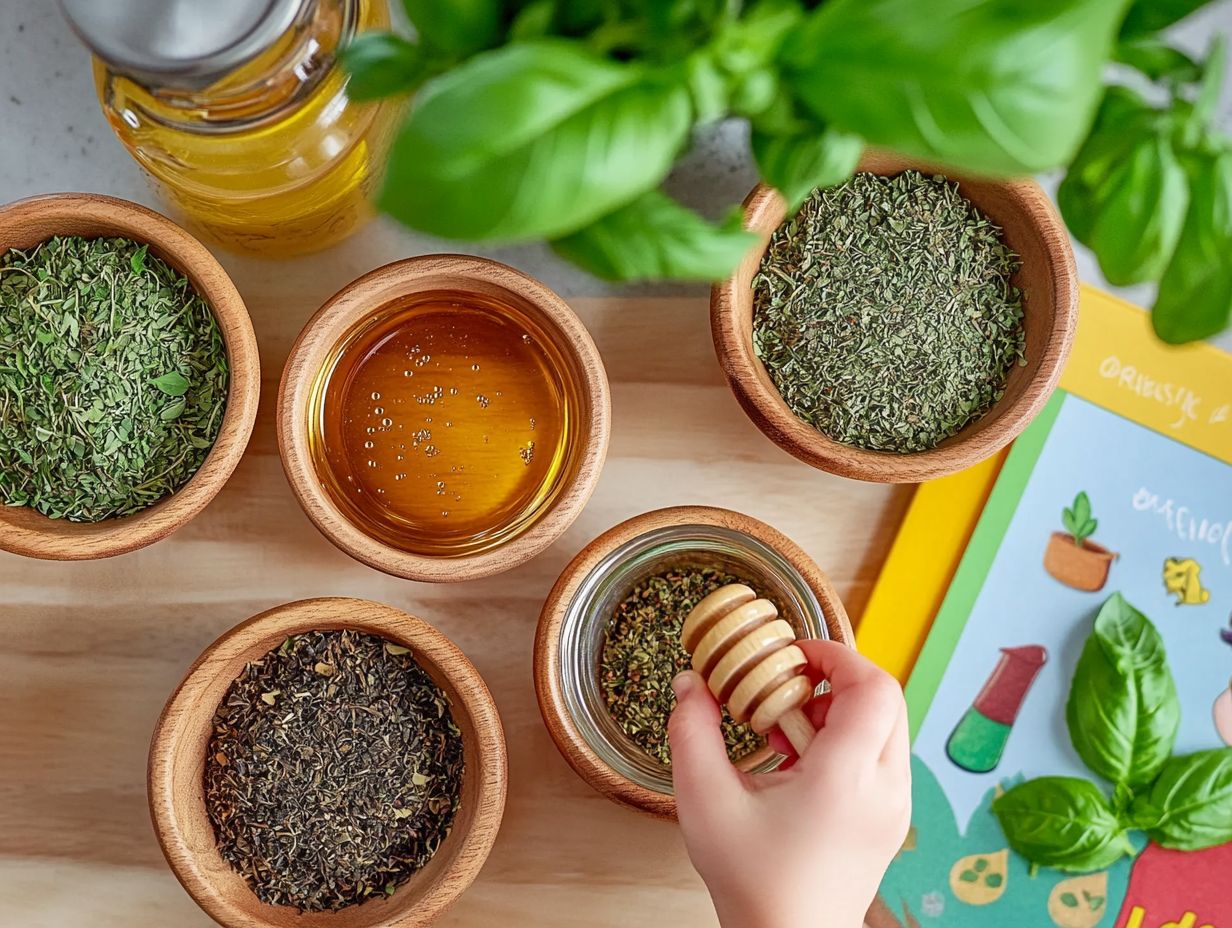
Choosing herbal remedies for your children is a growing trend among parents who are seeking natural alternatives to conventional medicine. These holistic options can support your child’s health with immune-boosting properties and gentle, effective ingredients minus the harsh side effects.
Derived from plants, these natural solutions offer both safety and efficacy, especially for those concerned about the potential risks of pharmaceutical drugs.
With a diverse array of herbal products available, you can find remedies suited to various needs, whether it’s soothing digestive issues or easing anxiety.
Before introducing these treatments, always prioritize safety by consulting healthcare providers. Professionals can offer tailored advice and ensure there are no harmful interactions with other medications.
When used wisely, herbal remedies can be a fantastic and exciting addition to traditional treatments, providing a well-rounded approach to your child’s health.
What Are the Safety Concerns with Herbal Remedies for Children?
When considering herbal remedies for your children, safety should be at the forefront. Not all herbs are a good match for young ones, and sticking to proper dosages is key to ensuring a secure and beneficial experience.
You ll want to exercise particular caution with herbs like chamomile. While generally regarded as safe, it can trigger allergic reactions in some children, particularly those with pollen sensitivities.
Similarly, herbs such as echinacea and valerian root might not be suitable for every age group or health condition.
Consulting with a healthcare professional is essential; they can offer tailored advice on safe and effective dosages that meet your child’s specific needs.
As you introduce herbal remedies, start with small amounts and keep a close eye out for any adverse reactions. Gradually incorporate these natural aids into your child’s routine in a thoughtful and responsible manner.
Explore the world of herbal remedies today to find the right match for your child’s needs!
What Are the Different Forms of Herbal Remedies for Children?
Herbal remedies for children come in a variety of delightful forms, including tinctures, teas, syrups, and baths. Each offers unique benefits to support your child’s health and wellness.
These options let you tailor natural solutions to your child’s needs, making it easier to incorporate them into your child’s routine.
Herbal tinctures are strong plant-based liquids that mix well into water or juice. Chamomile for relaxation and echinacea for an immunity boost are popular choices.
Think about herbal teas like peppermint or ginger; they soothe digestive issues and can be enjoyed warm or chilled, making them a refreshing hydration option.
Syrups, often sweet and flavorful, are a tasty way to introduce herbs like elderberry, which boosts immunity and fights colds.
Don’t overlook soothing herbal baths featuring calming ingredients like lavender or oatmeal. These baths promote relaxation and alleviate skin irritations, enhancing your child’s overall well-being.
How Can Parents Administer Herbal Remedies to Their Children?
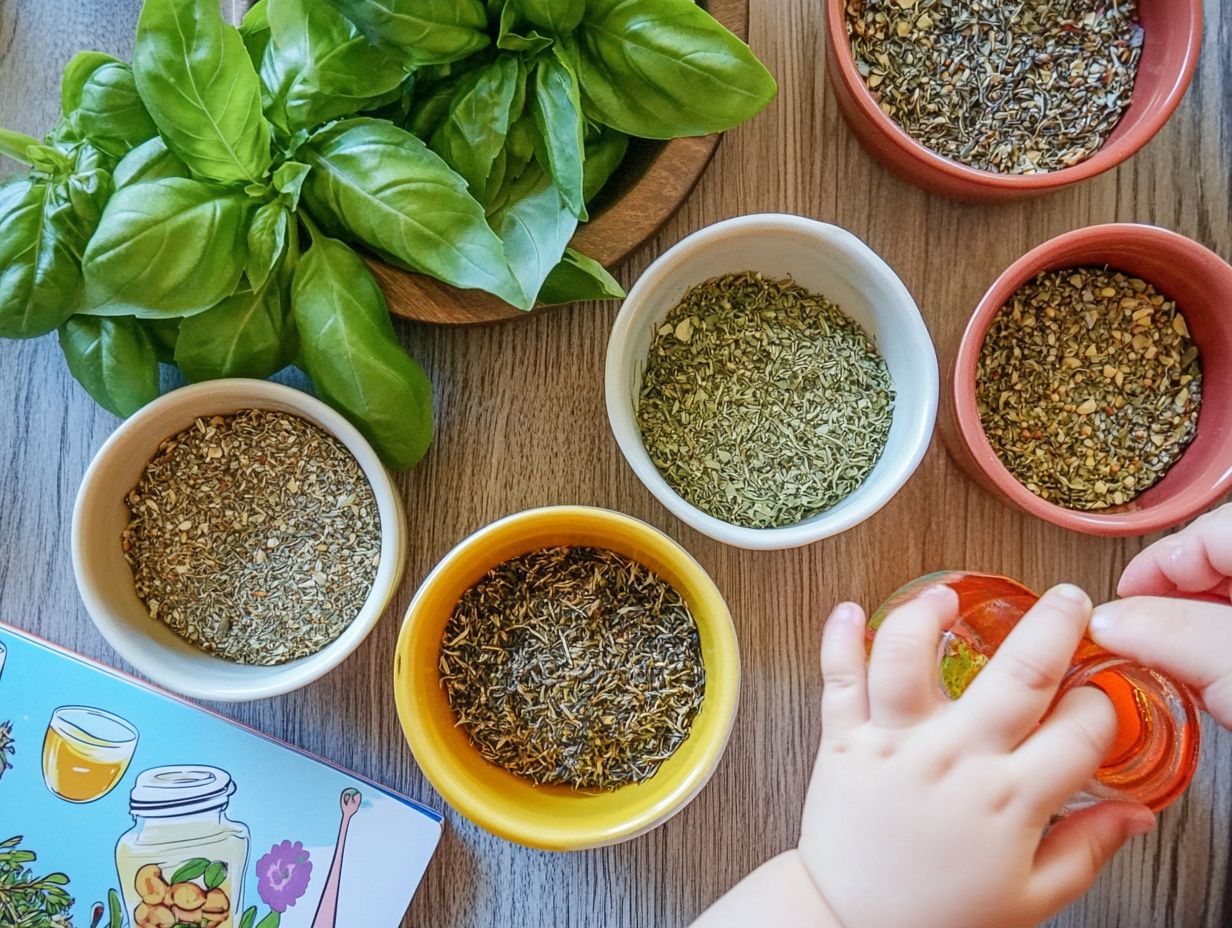
Administering herbal remedies to children is simple and fun! Choose methods that match your child’s tastes, like mixing herbal tinctures into their favorite drinks or serving herbal teas made for their preferences.
Creating a fun atmosphere around these remedies makes natural options much more appealing. For example, adding honey to herbal teas can beautifully mask the bitterness of chamomile, turning it into a delightful treat.
Consider flavorful herbs like peppermint or ginger, which taste great and aid digestion. Mixing fresh herbs into smoothies or yogurt is another hit strategy, encouraging kids to embrace these beneficial additions.
The ultimate goal is to blend health with enjoyment, so the journey to wellness is both delightful and effective.
What Are the Common Illnesses That Can Be Treated with Herbal Remedies?
Herbal remedies can effectively address common ailments that children face, such as coughs, colds, digestive issues, and respiratory health concerns. These remedies are valuable for parents seeking natural solutions to support their child’s well-being.
For soothing coughs, honey and thyme are often recommended due to their antibacterial properties and ability to alleviate throat irritation.
If your child catches a cold, elderberry syrup might be your go-to choice; it s well-known for boosting the immune system and lessening symptom severity.
Chamomile tea serves as a gentle remedy for digestive troubles, easing stomach cramps and promoting relaxation.
For respiratory issues, eucalyptus can be helpful; adding it to a warm bath or using it in a diffuser can help clear congestion and support easier breathing, providing holistic relief for your child.
Discover the joy of herbal remedies today and support your child s health naturally!
Are There Any Side Effects of Using Herbal Remedies for Children?
Herbal remedies can offer many benefits. However, as a parent, it’s important to be aware of potential side effects.
Some herbs can cause unwanted effects in children if not used properly. For instance, chamomile and peppermint may sometimes lead to allergic reactions, stomach issues, or drowsiness.
To reduce these risks, start with small doses. Always watch your child for any negative reactions after giving them an herbal remedy.
Keeping an open line of communication with healthcare professionals is key. They can provide tailored advice about specific herbal treatments.
By monitoring your child closely after introducing a new remedy, you can ensure their safety and well-being. This approach allows for informed decisions about herbal medicine.
Frequently Asked Questions
What are 5 herbal remedies for children s health?
- Echinacea: This herb is known for boosting the immune system and can help prevent colds and flu.
- Chamomile: Often used for digestive issues, chamomile can also calm anxious or irritable children.
- Ginger: Ginger has anti-inflammatory properties and can relieve nausea and stomach upset.
- Elderberry: High in antioxidants, elderberry helps strengthen the immune system against infections.
- Peppermint: This herb can relieve headaches and stomach pain while aiding respiratory issues.
Are these herbal remedies safe for children?
Yes, these remedies are generally safe when used correctly. Always check with a pediatrician before giving any herbs, especially if your child is on medication or has health issues.
How can these herbal remedies benefit my child s health?
These remedies offer a natural way to support your child’s health. They can boost immunity, relieve common symptoms, and promote overall wellness.
Are there any side effects of using these herbal remedies for children?
While generally safe, these remedies can cause allergic reactions or upset stomachs. Always follow recommended dosages and consult a healthcare provider if there are any concerns.
Can these herbal remedies be used alongside conventional medicine?
Yes, but inform your child’s healthcare provider about any herbal remedies to avoid possible interactions.
How can I administer these herbal remedies to my child?
Herbal remedies come in teas, syrups, capsules, or tinctures. The right dosage depends on your child’s age, weight, and health condition. Always follow the product label or consult a healthcare provider.
In summary, exploring herbal remedies can benefit your child’s health. Always ensure safety and seek guidance from healthcare professionals for the best results.

